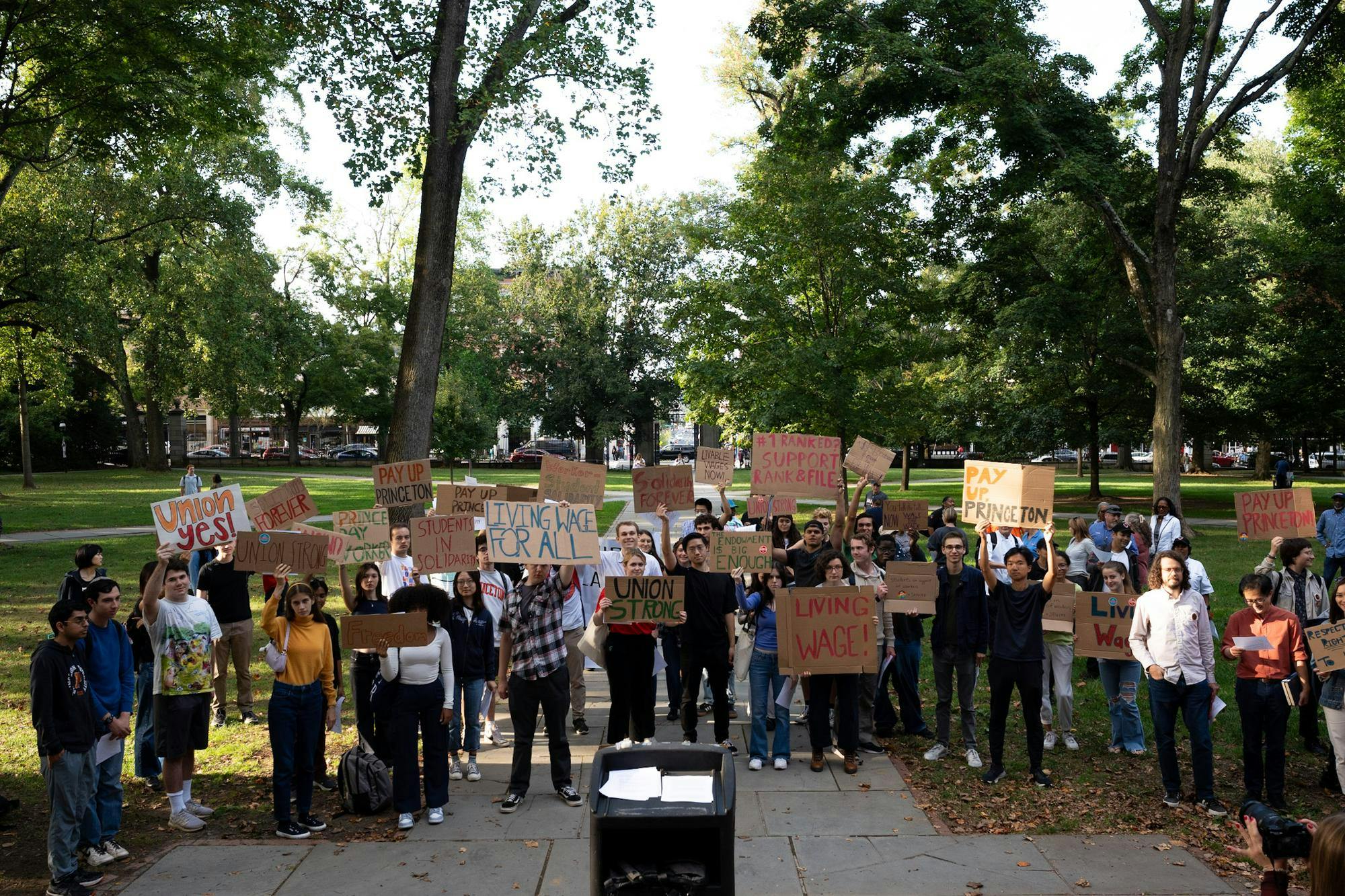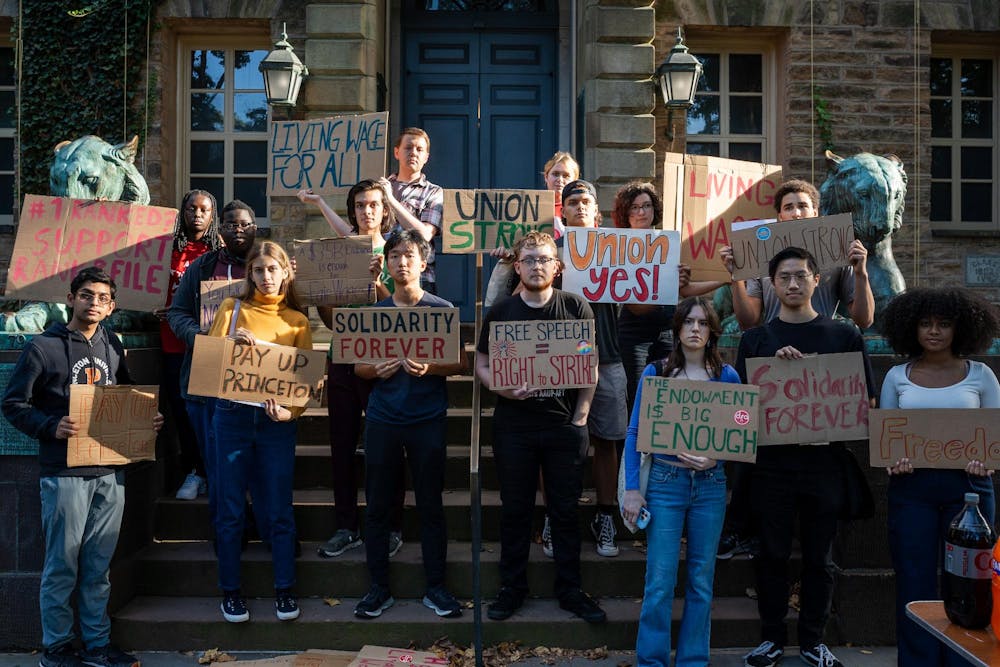University students joined campus workers this past Thursday in voicing concerns over employees’ inadequate wages, restrictions on speech, and lack of support from the University. The event was held by the Young Democratic Socialists of America (YDSA) and supported by Service Employees International Union (SEIU)-175, with remarks from SEIU president Jeff Coley, Princeton Graduate Students United (PGSU), and several union members.
Over 100 students and staff attended the town hall. During a speech, Coley claimed that the University’s starting wage is $20.75 an hour — a number that has increased by only 17 cents in the last three years. Additionally, Coley emphasized the struggles that many union members face: their inability to strike and make ends meet with their current salaries.
“We have members that are working two to three jobs, jobs just to make ends meet … [employees] don’t even have time for their families,” Coley told the crowd. “Princeton University needs to be the market,” he said, referring to Princeton’s prioritization of the market over its workers.

YDSA is the campus chapter of the Democratic Socialists of America (DSA), the largest socialist organization in the country. Last semester, YDSA members criticized the University for what they characterized as restrictions on free expression for service workers. YDSA also surveyed 116 union service workers during the Spring 2023 semester on their experience at the University.
Thursday’s demonstration was organized to “highlight the disrespectful and alienating treatment of the University to its employees,” according to co-chair of YDSA Bryce Springfield ’25. The YDSA survey highlighted concerns about “poor job descriptions, lackluster pension and childcare benefits, lost vacation opportunities for families, lost vacation opportunities for families, the no-strike clause, and having to pay for parking and gym memberships at their place of work.”
With the “most critical and widespread concern” being the necessity of a livable wage, workers have told the YDSA that they are unable to afford basic necessities and feel that the University “would not care if they were gone tomorrow.”
As clarified in Article 35 of the agreement between SEIU and the University, union members and employees are not permitted to strike or engage in behaviors that interfere with their work. If so, they may be subjected to termination or other disciplinary consequences.
“We hosted this rally by request of the Union workers because they cannot fully exercise their free speech nor hold signs,” Springfield said. He added that “workers are not allowed to speak under certain circumstances,” a phenomenon that has limited the prospect of workers reading out statements as these too violate the no-strike clause.
SEIU is a nationwide union that advocates for increased pay, health benefits, retirement security, and paid time-off, with SEIU-175 being the local chapter in Princeton. The union is campus-based and includes over 700 Princeton service workers ranging from dining hall staff to mailroom staff, to landscapers.
Several union members also addressed the crowd, expressing their love of working with and for the students. Even so, they expressed a need for greater recognition from the University for their work. After each worker spoke, pro-union chants such as “Union, Yes! Eisgruber, No!” were repeated across the crowd.
Anonymous written submissions, given to the YDSA for its members to read out of fear of potential backlash, also poured in from service workers over the lack of a livable wage they’re offered.
One statement read “I left a job that paid [me] significant[ly] better but couldn’t pass up the chance to work for what I thought at the time was a world-class university. I have come to realize that it’s smoke and mirrors, that Princeton wants to pay us middle-to-low end-of-the-scale [wages] and expect to be talked about in the same breath as Harvard [when] Harvard facilities [members] get paid higher than [us].”
Similarly, one person wrote that “[Princeton] likes to say that the pay is much lower because of the benefits. The benefits aren’t that much better … they underpay us at every position and us employees just need more money to be able to live. Multiple coworkers are thinking about leaving and some have [already] left.”
Another person expressed a similar sentiment: “I have already cut out any unnecessary spending in my life, but after rent, utilities, child support, food, car insurance, and fuel for my car, I’m lucky to have any money left,” read the testimonial.
Someone else voiced that the workers’ job is “humble, and at times thankless, but it’s essential and more recognition and compensation for the great work we do around the clock would boost morale by a huge margin.”
In a written statement to the ‘Prince,’ University spokesperson Michael Hotchkiss said that “Princeton deeply values its SEIU employees and their important contributions to the pursuit of the University’s mission. We also appreciate our productive working relationship with the SEIU Union [sic] and we look forward to maintaining that through the coming contract negotiations.”
Students have also expressed their thoughts and concerns over the experiences that University service workers face.
YDSA co-chair Abdul-Bassit Fijabi ’24 told the ‘Prince’ that it is “really upsetting to hear [these experiences] given how many resources Princeton has and its ability to adequately support [its workers].” Fijabi revealed that when the issue of the cost of living was raised, the University “kind of brushed it off, and prioritized marketing considerations over the actual viability of workers.”
Additionally, Fijabi highlighted the importance of student efforts in helping employees navigate these adverse experiences.
“At the baseline, every single person can treat workers with respect [and] recognize that they are working very hard [while dealing] with bare minimum wages; they have to do a lot of stuff on a day-to-day basis,” Fijabi said.
Additionally, he stressed the need for more sustained conversations on the issues faced by service workers, as well as student participation in platforms that give workers the opportunity to voice them.
YDSA member Lake Liao ’27 echoed the necessity of campus voices in this matter.
“Students in the community and faculty … need to let [workers] know that [they] are aware of these things … and that [they’re] standing in solidarity with the service workers that are bargaining for a contract for better wages that rise with inflation … and let them afford the standard cost of living in Princeton,” Liao said.
“We would really like the University to end [the no-strike clause], and give their service workers a voice because this is not a fair form of employment; [workers] are not able to have any sort of legal leverage over the University,” Liao added.
Coley told the crowd that he hoped that this rally would be a wake up call for the University trustees.
“Markets do nothing for our Union workers. We are the market!” he added.

The rally was held on Sept. 21, in front of Nassau Hall. It lasted an hour before the crowd dispersed peacefully.
Jasmyn Dobson is a senior News contributor for the ‘Prince.’
Louisa Gheorghita is a staff News writer for the ‘Prince.’





